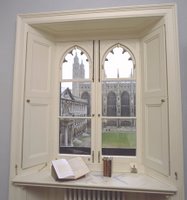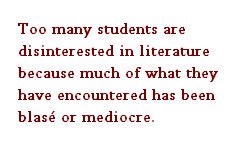 Should we be teaching Shakespeare and other “classics” to Academically weak students? Literature that is well chosen should communicate the fundamentally human experience that exceeds a particular time period and goes beyond a specific culture—including the academic culture. If this is true of Shakespeare, then we must teach Shakespeare to high achievers as well as academically weak students. The approach may differ, but the content is the same—the human experience.
Should we be teaching Shakespeare and other “classics” to Academically weak students? Literature that is well chosen should communicate the fundamentally human experience that exceeds a particular time period and goes beyond a specific culture—including the academic culture. If this is true of Shakespeare, then we must teach Shakespeare to high achievers as well as academically weak students. The approach may differ, but the content is the same—the human experience.What makes a “classic” a “classic”? The answer, I believe, is three-fold. A classic is a work that was written in a particular time and place by a particular person but has risen beyond its cultural context to apply to humans in any time and place.
 A classic also needs to have influence on subsequent literature and cultures. Lastly, a classic is a work that reflects the beauty and excellence of human creative ability; in other words, it is well written. I think students need to be exposed to works other than “classics”, but I believe that the cornerstone of an English program needs to be classic literature.
A classic also needs to have influence on subsequent literature and cultures. Lastly, a classic is a work that reflects the beauty and excellence of human creative ability; in other words, it is well written. I think students need to be exposed to works other than “classics”, but I believe that the cornerstone of an English program needs to be classic literature.Too many students are disinterested in literature because much of what they have encountered has been blasé or mediocre. As a teacher of Creative Writing, I believe it is essential that students distinguish “good” literature so they are able to write their own. Great Canadian writers Timothy Findley, Margaret Laurence, Robertson Davies, Carol Shields et al were all prolific readers and they all had countless “classics” under their belt. Without an excellent goal to aim for (or surpass) how can we expect our students to excel beyond mediocrity?




No comments:
Post a Comment